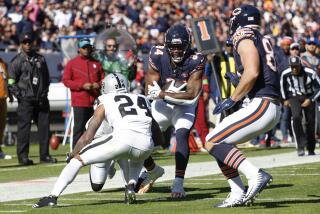NFL Urging Players to Watch Steps in Tampa
- Share via
Hundreds of NFL players who aren’t competing in the Super Bowl attend the game each year to enjoy the hoopla and appear at various functions.
But the Ray Lewis case, as well as the 1999 arrest of Atlanta Falcon safety Eugene Robinson for soliciting sex from an undercover Miami police officer the night before he was to play in the Super Bowl, heighten concern about player behavior.
That doesn’t mean the NFL is discouraging players from attending.
“Not at all. This certainly wasn’t an issue of the number of players at the Super Bowl,” NFL spokesman Greg Aiello said.
The NFL instead focuses on warning players about their activities and the people they associate with as part of regular visits with each team during the season. The NFL also routinely holds a Super Bowl security briefing for the competing teams.
“This type of issue had been addressed on an ongoing basis, in terms of association and the situations you can get into,” Aiello said. “Association is a major issue and has been. It’s a key lesson of the Ray Lewis situation.”
At the NFL’s annual rookie symposium before this season in San Diego, first-year players heard from a firsthand source: Lewis.
“The main thing he told us was to hang around the right people and learn from his mistake,” said rookie running back Jamal Lewis, a Baltimore Raven teammate who is not related to Lewis.
“It made a big impression on people, being that he was innocent and still got caught up in that. You have to be careful who you hang around with.”
This year’s Super Bowl appears to have an added risk: The city of Tampa, Fla., is enforcing an ordinance against nude lap-dancing at the city’s strip clubs that has resulted in 200 arrests since the law took effect in late 1999.
Among those arrested earlier this month were Dallas Star hockey players Ted Donato and Tyler Bouck.
“We’re aware of that, and that will be addressed in our security presentations to both teams,” Aiello said.
The penalty for the misdemeanor offense carries a maximum $1,000 fine or up to 60 days in jail.
Ultimately, the NFL and NFL Players Assn. believe they have been doing all they can.
“These are grown men with families,” said Carl Francis, an NFLPA spokesman. “If they can’t learn from the experiences of past Super Bowls, they’re just extremely irresponsible.
“Listen, I don’t think we can do any more than what’s been done in the past and shown by example.”
More to Read
Go beyond the scoreboard
Get the latest on L.A.'s teams in the daily Sports Report newsletter.
You may occasionally receive promotional content from the Los Angeles Times.










